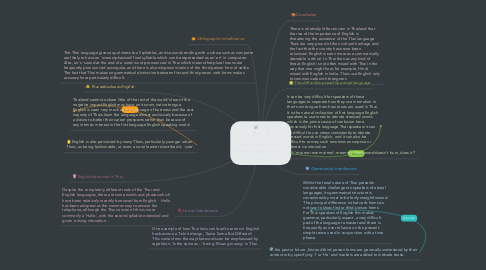ESL PROBLEM? Differences between Thai and English
by phicha xq

1. Thai attitudes to English
2. Thailand seems to share little of the rest of the world's fear of the negative impact English may have on its own, native tongue. English is seen very much as the language of business and the vast majority of Thais learn the language almost exclusively because of a desire to better their career prospects rather than because of any intrinsic interest in the first language English speaking world.
3. English is also perceived by many Thais, particularly younger urban Thais, as being fashionable, or even, as one learner described it, 'cute'.
4. Orthographic interference
5. The Thai language gives equal stress to all syllables, and so words ending with a schwa such as computer are likely to have an 'overemphasised' final syllable which can be represented as an 'err' in computerr. Also, an 's' sound at the end of a word is not pronounced in Thai which means that plural nouns are frequently pronounced as singular, and there is also mispronunciation of the third person form of verbs. The fact that Thai makes no grammatical distinction between first and third person verb forms makes accuracy here particularly difficult.
6. Lexical interference
7. One example of how Thai lexis can lead to errors in English has become a T-shirt design, 'Same Same But Different'. This comes from the way that words can be emphasised by repetition, 'Is the same as...' being 'Muang muang' in Thai.
8. English borrowed in Thai
9. Despite the completely different roots of the Thai and English languages, there are some words and phases which have been relatively recently borrowed from English. Hello has been adopted as the common way to answer the telephone, although the Thai version of this is more commonly a 'Hallo', with the second syllable extended and given a rising intonation.
10. the past or future ,first and third person forms are generally understood by their context or by specifying 'I' or 'He' and markers are added to indicate tense.
11. The difficulties posed by a tonal language
12. It can be very difficult for speakers of these languages to separate how they use intonation in their own tongue from how tones are used in Thai. It is the natural inclination of first language English speakers to use tones to denote stressed words which is the prime cause of confusion here. Conversely for first language Thai speakers it can be difficult to use stress consistently to denote stressed words in English, and it can also be difficult to convey such emotions as surprise or interest via intonation.
13. 'mai mai mai mai mai', meaning 'New wood doesn't burn, does it?'
14. Grammatical interference
15. Whilst the tonal nature of Thai presents considerable challenges to speakers of atonal languages, its grammatical structure is considered by most to be fairly straightforward. The principal difference is that verb forms do not vary to show first or third person forms. For Thai speakers of English this makes grammar, particularly aspect, a very difficult part of the language to master and there is frequently an over reliance on the present simple tense used in conjunction with a time phrase.
16. Conclusion
17. There is relatively little concern in Thailand that the rise of the importance of English is threatening the existence of the Thai language. Thais are very proud of their cultural heritage and the fact that the country has never been colonised. English is seen more as a commercially desirable 'add on' to Thai than as any kind of threat. English is not often mixed with Thai in the way that one might hear, for example, Hindi mixed with English in India. Thais use English only to communicate with foreigners


